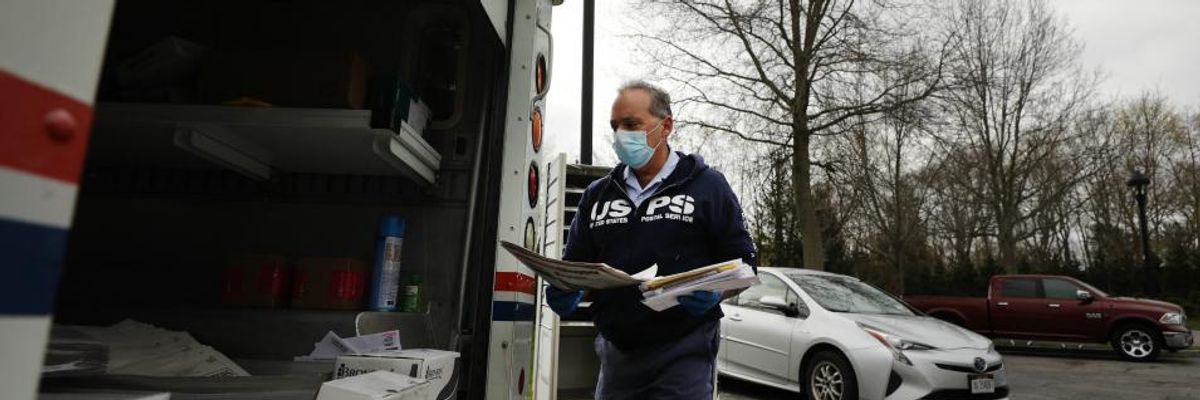The U.S. Postal Service on Wednesday once again confirmed why it is far and away the most popular government institution in the nation--and why it must be rescued from imminent collapse.
In a statement, USPS reiterated its longstanding policy of delivering absentee and mail-in ballots even if they lack adequate postage. "It is the Postal Service's policy not to delay the delivery of completed absentee or vote-by-mail ballots even if no postage has been affixed or if the postage is insufficient," the agency said.
"In cases where a ballot enters the mailstream without the proper amount of postage," the USPS said, "the Postal Service will collect postage from the appropriate Board of Elections."
Civil rights groups argue that requiring voters to pay for postage for mail-in and absentee ballots is unconstitutional. In a federal lawsuit filed against Georgia election officials earlier this month, the ACLU called the state's requirement that voters pay for postage on mail-in ballots "tantamount to a poll tax."
"Many lower-income voters do not have postage stamps," the lawsuit states. "They no longer need to use them or have never needed to use them. They cannot be expected to needlessly expose themselves to the pandemic just to get stamps in order to vote."
The increased demand for absentee and mail-in ballots amid the Covid-19 outbreak--and the growing push for nationwide vote-by-mail in time for the November elections--has made the USPS policy all the more important.
"All the plans we have for a safe and legitimate general election in November depend heavily upon the ability to expand vote-by-mail," Richard Hasen, a professor University of California-Irvine School of Law, wrote in a column for Slate last week. "Yet those plans would be completely upended if the United States Postal Service collapses."
The Postal Service has been hit hard by the decline in mail volume resulting from the coronavirus pandemic, and the agency remains hindered by a congressional mandate requiring it to fund its retirees' health benefits through the year 2056.
Postmaster General Megan Brennan warned lawmakers earlier this month that USPS could collapse within the next several months if Congress doesn't quickly provide funding.
But President Donald Trump is standing in the way: According to the Washington Post, Trump threatened to veto the CARES Act--which Congress passed last month--if it included direct relief for the Postal Service. Lawmakers and advocates are demanding that Congress include Postal Service funding in the next coronavirus stimulus package.
Mark Dimondstein, president of the American Postal Workers Union, warned in an interview with In These Times last week that Trump administration officials are attempting to use the coronavirus crisis to privatize USPS.
"Their agenda is to enrich a few of their private sector friends at the expense of the people of our country," said Dimondstein. "The underlying thing is, they're coming after a right of the people."
As Common Dreams reported earlier this month, in the face of inaction from the White House and Congress, people have been buying stamps in bulk and urging those who can afford it to do so as well in an effort to show support for the Postal Service.
"I just bought a book of Marvin Gaye stamps on USPS.com because, among other things, I want to be able to vote by mail," wrote one Twitter user. "Let's all buy stamps today and save the Post Office."

